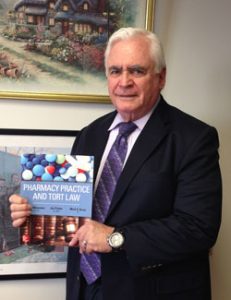
A decade ago, the primary legal references for pharmacy students were dense, jargon-filled tomes, so abstract and tedious to read, students openly complained how uninteresting they were.
This prompted USC associate professor Fred Weissman, who holds both PharmD and JD degrees, to write an engaging reference book filled with real-life case presentations to help pharmacy students and practicing pharmacists better understand the concepts of tort law and apply them to their own experiences.
Published in Feb. 2016, Pharmacy Practice and Tort Law (McGraw-Hill Education), focuses on the civil liabilities a pharmacist may face in real-world practice, including negligence, fraud and defamation. The book describes each tort in detail, outlining the elements that must be proven for successful litigation.
The book employs Socratic method, posing engaging take-away questions to the reader. “I think learning is better when you ask a question,” says Weissman, who co-authored the book with Jim Pinder and Mark R. Berns.
Weissman is exceptionally well-versed on conveying legal information to pharmacy students and pharmacists, having taught USC students throughout their pharmacy studies since 1981. He teaches a semester-long course on statutory and regulatory state laws complemented by a discussion of relevant federal laws.
Today, as the role of the pharmacist continues to expand, it is critically important for pharmacists to know and understand the laws pertaining to their practice, he says.
“We’re a very litigious society, no question about it,” Weissman says. “[Pharmacists] are being engaged in more and more responsibility. Now the pharmacist has to communicate with the patient—the law requires it. You have to make judgements and they have to be prudent.”
Weissman, who authored A Guide to California Community Pharmacy Law, now in its 8th edition, also serves as USC School of Pharmacy associate dean for faculty and student affairs and admissions. Pharmacy Practice and Tort Law is his second book.

